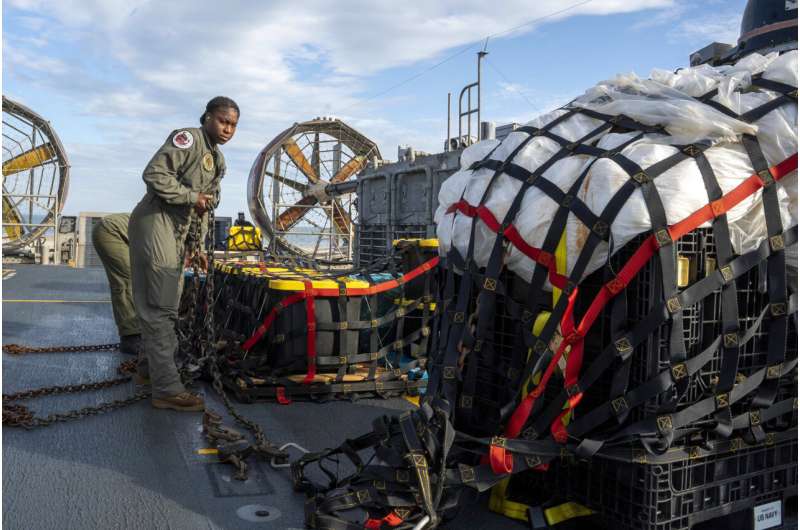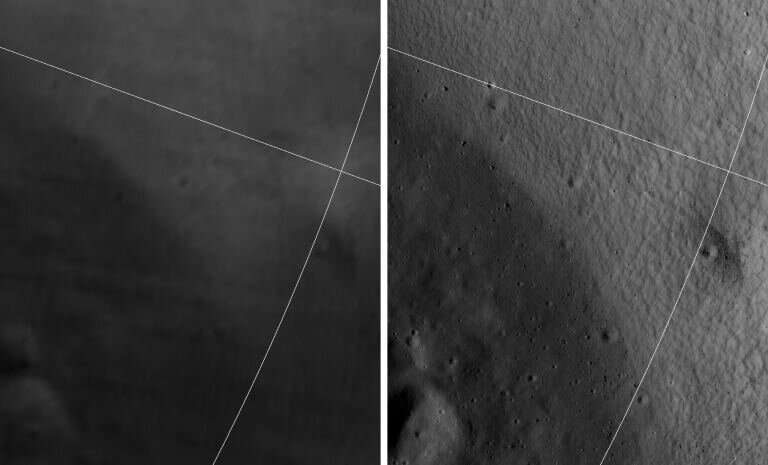Media invitation: View Euclid spacecraft in Cannes before launch
Tuesday, 14 February 2023 07:40
Journalists are cordially invited to view Euclid, ESA’s ambitious mission to explore the dark Universe, in Cannes, France, on 21 February 2023.
Media will be given the rare opportunity to see the spacecraft in the cleanroom of Thales Alenia Space (TAS), prior to shipment for its launch from Cape Canaveral, Florida, USA in July 2023.
Rumors swirl about balloons, UFOs as officials stay mum
Tuesday, 14 February 2023 06:14
Intuitive Machines completes SPAC merger
Tuesday, 14 February 2023 03:06
Commercial lunar lander company Intuitive Machines has completed its merger with a special purpose acquisition company (SPAC), raising far less money than originally anticipated.
Satellites support impact assessment after Turkiye-Syria earthquakes
Tuesday, 14 February 2023 02:45 Turkiye and Syria are reeling from one of the worst earthquakes to strike the region in almost a century. Tens of thousands of people have been killed with many more injured in this tragedy.
Satellite data are being used to help emergency aid organisations, while scientists have begun to analyse ground movement - aiding risk assessments that authorities will use as they plan recovery and r
Turkiye and Syria are reeling from one of the worst earthquakes to strike the region in almost a century. Tens of thousands of people have been killed with many more injured in this tragedy.
Satellite data are being used to help emergency aid organisations, while scientists have begun to analyse ground movement - aiding risk assessments that authorities will use as they plan recovery and r NASA, partners clear Axiom's second private astronaut mission crew
Tuesday, 14 February 2023 02:45 NASA and its international partners have approved the crew for Axiom Space's second private astronaut mission to the International Space Station, Axiom Mission 2 (Ax-2).
Axiom Space's Director of Human Spaceflight and former NASA astronaut Peggy Whitson will command the privately funded mission. John Shoffner of Knoxville, Tennessee, will serve as pilot. The two mission specialists, Ali Al
NASA and its international partners have approved the crew for Axiom Space's second private astronaut mission to the International Space Station, Axiom Mission 2 (Ax-2).
Axiom Space's Director of Human Spaceflight and former NASA astronaut Peggy Whitson will command the privately funded mission. John Shoffner of Knoxville, Tennessee, will serve as pilot. The two mission specialists, Ali Al Russian Progress cargo craft docks at space station suffers loss of coolant
Tuesday, 14 February 2023 02:45 On February 11, a Russian unmanned Progress MS-22/83P cargo ship successfully docked to the Zvezda service module at the International Space Station (ISS), however for the second time in just two months, another Progress has sprung a leak.
Shortly after docking, Russia's space agency Roscosmos in Moscow announced via Telegram that mission control detected a "depressurization" in the Progre
On February 11, a Russian unmanned Progress MS-22/83P cargo ship successfully docked to the Zvezda service module at the International Space Station (ISS), however for the second time in just two months, another Progress has sprung a leak.
Shortly after docking, Russia's space agency Roscosmos in Moscow announced via Telegram that mission control detected a "depressurization" in the Progre Spacecraft controllers aim for the heights
Tuesday, 14 February 2023 02:45 Like many office workers, Hu Guolin and his colleagues deal with figures, charts and graphics on their computer screens.
However, the information in front of Hu's team comes from Earth's orbit or even planets hundreds of millions of kilometers away.
From the first day of its existence, people working at the Beijing Aerospace Control Center - like Hu, some of the smartest minds in Chi
Like many office workers, Hu Guolin and his colleagues deal with figures, charts and graphics on their computer screens.
However, the information in front of Hu's team comes from Earth's orbit or even planets hundreds of millions of kilometers away.
From the first day of its existence, people working at the Beijing Aerospace Control Center - like Hu, some of the smartest minds in Chi Earth's atmosphere adds a quick pinch of salt to meteorites, scientists find
Tuesday, 14 February 2023 02:45 New analysis of the Winchcombe meteorite has revealed just how quickly space rocks which fall to Earth can be contaminated by our atmosphere.
The meteorite, which landed in Gloucestershire in February last year, was the first to be recovered on UK soil in nearly 30 years.
Fragments were recovered from a domestic driveway hours after it entered the Earth's atmosphere. More pieces were
New analysis of the Winchcombe meteorite has revealed just how quickly space rocks which fall to Earth can be contaminated by our atmosphere.
The meteorite, which landed in Gloucestershire in February last year, was the first to be recovered on UK soil in nearly 30 years.
Fragments were recovered from a domestic driveway hours after it entered the Earth's atmosphere. More pieces were Let's Drill: Sols 3742-3743
Tuesday, 14 February 2023 02:45 Currently we are drilling the Dinira target! The scientists and engineers have been closely working together to adjust the drilling strategy to give us the best shot of a successful drill while also managing the wear and tear on our hardware. There is no guarantee it will work as Mars always loves to throw us curveballs, but we're giving it our best! It is also cloud season on Mars, so in additi
Currently we are drilling the Dinira target! The scientists and engineers have been closely working together to adjust the drilling strategy to give us the best shot of a successful drill while also managing the wear and tear on our hardware. There is no guarantee it will work as Mars always loves to throw us curveballs, but we're giving it our best! It is also cloud season on Mars, so in additi Kigen and Skylo work together to bring eSIM and satellite connectivity to expand the potential of 5G IoT
Tuesday, 14 February 2023 02:45 Kigen, a global security leader in IoT enablement with its SIM, eSIM, and iSIM technology solutions, and Skylo, a Satellite Network or Non-Terrestrial Network (NTN) operator focused on connecting anything, anywhere, are together making satellite connectivity integration frictionless for device makers, allowing for seamless transitions between cellular and satellite connectivity via Skylo's SIM p
Kigen, a global security leader in IoT enablement with its SIM, eSIM, and iSIM technology solutions, and Skylo, a Satellite Network or Non-Terrestrial Network (NTN) operator focused on connecting anything, anywhere, are together making satellite connectivity integration frictionless for device makers, allowing for seamless transitions between cellular and satellite connectivity via Skylo's SIM p Kacific and partners expand satellite connectivity in Southeast Asia and other regions
Tuesday, 14 February 2023 02:45 Kacific Broadband Satellites Group (Kacific) and ST Engineering iDirect have reaffirmed their long-term technology partnership through deep cooperation on the ground systems infrastructure for Kacific's fleet of satellites.
ST Engineering iDirect, whose Dialog hub platform was instrumental to Kacific1's highly successful program, will provide a comprehensive next-generation ground infrastr
Kacific Broadband Satellites Group (Kacific) and ST Engineering iDirect have reaffirmed their long-term technology partnership through deep cooperation on the ground systems infrastructure for Kacific's fleet of satellites.
ST Engineering iDirect, whose Dialog hub platform was instrumental to Kacific1's highly successful program, will provide a comprehensive next-generation ground infrastr SpaceX launches 55 Starlink satellites early Sunday morning
Tuesday, 14 February 2023 02:45 The 229-foot-tall (70-meter) Falcon 9 rocket thundered off from Space Launch Complex 40 at Cape Canaveral Space Force Station, Florida, at 12:10:10 a.m. EST (0510:10 GMT) on Sunday, despite the weather.
SpaceX's Starlink Group mission 5-4 launched 55 Starlink satellites onboard the Falcon 9. This is the fourth launch into a new orbital shell for SpaceX's second-generation Starlink constell
The 229-foot-tall (70-meter) Falcon 9 rocket thundered off from Space Launch Complex 40 at Cape Canaveral Space Force Station, Florida, at 12:10:10 a.m. EST (0510:10 GMT) on Sunday, despite the weather.
SpaceX's Starlink Group mission 5-4 launched 55 Starlink satellites onboard the Falcon 9. This is the fourth launch into a new orbital shell for SpaceX's second-generation Starlink constell Large number of launches planned
Tuesday, 14 February 2023 02:45 China plans to carry out more than 70 launch missions this year, according to the nation's major space contractors.
China Aerospace Science and Technology Corp, the nation's dominant space enterprise, has more than 60 launch missions planned for this year, and it aims to deploy more than 200 spacecraft in orbit, according to the Blue Book of China Aerospace Science and Technology Activitie
China plans to carry out more than 70 launch missions this year, according to the nation's major space contractors.
China Aerospace Science and Technology Corp, the nation's dominant space enterprise, has more than 60 launch missions planned for this year, and it aims to deploy more than 200 spacecraft in orbit, according to the Blue Book of China Aerospace Science and Technology Activitie Noise complaints help bring down launch startup SpaceRyde
Monday, 13 February 2023 22:14
Canadian launch startup SpaceRyde has filed for bankruptcy just months after noise complaints put an end to rocket engine tests.
New spacecraft can see into the permanently shadowed craters on the moon
Monday, 13 February 2023 21:11
Shackleton Crater at the lunar south pole is one of the locations on NASA's shortlist for human exploration with the future Artemis missions. But because craters at the lunar poles—like Shackleton—at have areas that are perpetually in shadow, known as permanently shadowed regions (PSRs), we don't know for sure what lies inside the interior. However, a new spacecraft with a specialized instrument is about to change all that.

